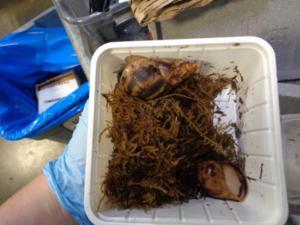U.S. Customs and Border Protection (CBP) agriculture specialists intercepted two giant African snails at the Louisville Port of Entry on May 18.
The live snails were discovered at an express consignment facility during an inspection of a parcel arriving from Germany.

"Our nation's food supply is constantly at risk from pests and diseases not known to occur in the United States. These significant interceptions by our CBP agriculture specialists at the Louisville Port of Entry exemplify CBP's continued commitment to safeguarding American agriculture," said LaFonda D. Sutton-Burke, Director, Field Operations-Chicago Field Office.
According to the USDA, giant African snails can carry a parasitic nematode that can lead to meningitis in humans and due to an appetite, that includes at least 500 different types of plants, along with plaster and stucco, they can cause significant damage to structures and ecosystems. They are considered a prohibited organism in the United States, though they are popular for consumption and even kept as pets in other countries.
“CBP’s agriculture specialists mitigate the threat of non-native pests, diseases, and contaminants entering the United States,” said Thomas Mahn, Port Director, Louisville. “CBP agriculture specialists have extensive training and experience in the biological sciences and agricultural inspections, inspecting tens of thousands of international passengers and cargo shipments at our air, land and sea ports of entry.”









